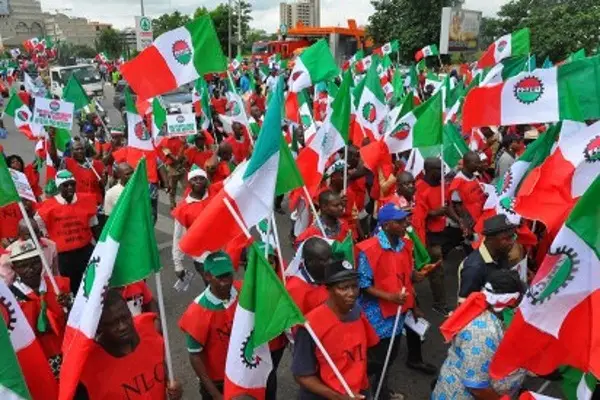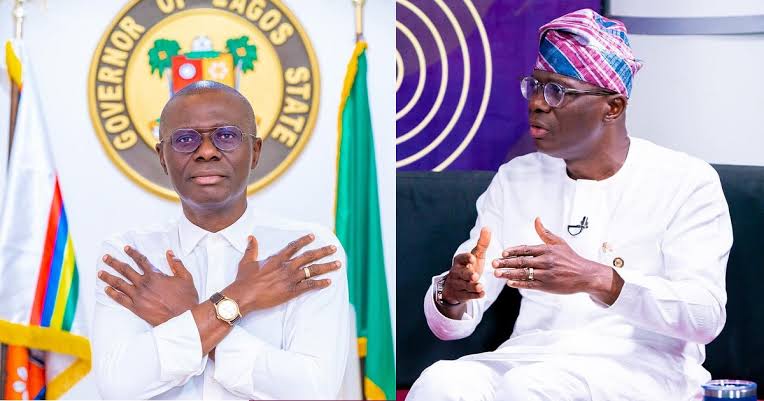
The Attorney-General of the Federation and Minister of Justice, Lateef Fagbemi, (SAN), has faulted the organised labour over the nationwide strike it is starting today (Monday).
Fagbemi, in a letter to the Nigeria Labour Congress and the Trade Union Congress leaders, dated June 1, 2024, insisted that the strike over the new minimum was a violation of a subsisting National Industrial Court order restraining the unions from grounding the nation through the strike action.
The AGF said this as a meeting convened by the National Assembly leaders on Sunday night failed to achieve its objective following the NLC and TUC’s insistence on going ahead with today’s strike.
The meeting, which was presided over by the President of the Senate, Godswill Akpabio, and the Speaker of the House of Representatives, Tajudeen Abbas, was attended by the NLC president Joe Ajaero, and his TUC counterpart, Festus Osifo.
Also, the Minister of State for Labour, Nkeiruka Onyejeocha, affirmed that the government could not pay more than N60,000, which she said represented a 100 per cent increase on the current minimum wage.
On Sunday, the Special Adviser to President Bola Tinubu on Information and Strategy, Bayo Onanuga, told The PUNCH that the labour leaders might have an ulterior motive, stressing that the minimum wage offer they presented was unrealistic for both the federal and state governments.
N60,000 offer
On Friday, Organised Labour declared an indefinite nationwide strike due to the Federal Government’s refusal to increase its new minimum wage offer above N60,000.
The President of the NLC, Joe Ajaero, announced that the strike followed failed negotiations between the government and organised labour, and its refusal to reverse the withdrawal of the power sector subsidy and increase in electricity tariff.
The unions had earlier given the May 31, 2024 deadline for the conclusion of new minimum wage negotiations.
The government had raised its minimum wage offer from N57,000 to N60,000 while the labour unions reduced their demand to N494,000 from N497,000 proposed earlier. The labour leaders initially demanded N615,000.
But the negotiations deadlocked as the government maintained its offer of N60,000, leading to the declaration of a nationwide indefinite strike.
However, the AGF in his letter addressed to the presidents of the NLC, Ajaero and the TUC, Festus Usifo, strongly condemned the planned industrial action, stating that it was wrong of organised labour to call out workers at a time when the government and other stakeholders were working towards determining a new national minimum wage.
The letter was copied to the Secretary to the Government of the Federation, the Chief of Staff to the President, the Minister of State for Labour and Employment, the National Security Adviser, the Inspector-General of Police and the Director-General, the Department of State Service.
Citing the Trade Union Dispute Act 2004, Fagbemi argued that the NLC and the TUC were required to issue mandatory strike notices of a minimum of 15 days.
The letter read, “It is pertinent to observe that at no time did either the NLC or the TUC declare a trade dispute with their employees or issue any strike notice as required by law for such strike action to be legitimate and lawful.
‘Strike premature’
“I wish to note that this latest declaration of strike action by organised labour is premature at a time when the Federal Government and other stakeholders involved in the tripartite committee on the determination of a new national minimum wage had not declared an end to negotiation,” Fagbemi noted.
Emphasising the significance of following due process in declaring a labour strike, the justice minister added, “By the Trade Union Dispute Act 2004, NLC and TUC are required to issue mandatory strike notices of a minimum of 15 days.
“It is pertinent to observe that at no time did either NLC or TUC declare a trade dispute with their employees or issue any strike notice as required by law for such strike action to be legitimate and lawful.
“It is not in doubt that the fundamental importance of the 15-day notice is underscored by the fact that both NLC and TUC failed to comply with the statutory condition precedents (dispute resolution procedures) provided for under section 18(b)(a) of the Trade dispute Act 2004, as amended.”
He also stressed that the proposed strike action is in breach of relevant conditions itemized under section 31(6) of the Trade Union Act, as amended.
“No person, trade union or employer shall take part in a strike or lockout or engage in any conduct in contemplation of any furtherance of trade dispute unless the person, trade union or employer is not engaged in the provision of essential services,” he declared, referencing the law.
The AGF further drew the attention of the labour leaders to an interim Injunction order granted by the National Industrial Court on June 5, 2023, in suit no: NICN/ABJ/158/23, between the Federal Government of Nigeria & Anor V. Nigerian Labour Congress & Anor.
The order restrained both NLC and TUC from embarking on any industrial action or strike of any nature.
The AGF noted that this “Order has neither been stayed nor set aside, therefore it remains binding on the labour unions.”
Fagbemi explained that the conditions outlined by Nigerian laws for exercising the right to strike were in tandem with the International Labour Organisation principles concerning the right to strike.
He assured that the government would adopt a conciliatory approach to resolving matters about workers’ and citizens’ welfare in the spirit of collective bargaining.
He appealed to the unions to shelve the planned strike and return to the negotiation meetings.
Addressing journalists after the meeting with the National Assembly leaders, the TUC President, Osifo, said, “The Senate President appealed to us to call off the strike.
“But we can’t sit here and call off the strike because we have other organs. We will take the appeals to our various organs.
“We don’t have the powers to call off the strike action. For now, the strike action will commence, while we discuss with our organs.”
But Akpabio appealed to the unions to shelve the strike, adding that “When the hospitals are closed, most poor people will die. Those who are even on oxygen will die. Those needing medical services will die. Goods and services will not move freely, productivity will reduce drastically. The living standards of Nigerians will also be impaired.”
Also speaking, Speaker Abbas said “There are three takeaways that we can go home with. One is that we have agreed to prevail on the government to revisit the issue of the 35k paid to Nigerian workers wage award that was started in October last year and stopped in February. We agreed that the wage award should continue until such a time that the minimum wage is agreed. We also agreed that the NLC and TUC should go and consult to suspend their strike as soon as possible to allow for negotiations to continue.”
Speaking with one of our correspondents in Abuja, on Saturday, the Minister of State for Labour, Onyejeocha, argued that the government and the Organised Private Sector could not afford the N494,000 demanded by labour.
“We are talking about the lowest level, minimum wage, that’s minimum level one. How will the Organised Private Sector pay? You’re talking about salary. Yes, things are hard, it’s hurting everybody, but the point is that is our economy buoyant? There’s so much inflation.
“So, if you pay somebody at level one N494,000, you’re talking about an increase of 1,547 per cent. We understand that, yes things are hard, let us increase the minimum wage by 100 percent from N30,000 to N60,000, and then you are telling us that people are already being paid over N70,000. I say from where, how?’’ she wondered.
Onyejeocha said the government had shown good faith, insisting that the palliatives and other social interventions indicate that President Bola Tinubu had been ‘very compassionate.’
Minister begs labour
She stated, “The President has been very compassionate. Check all the palliatives, all the interventions he’s been doing, just to make sure that things are fine.
“I have not seen any government in Nigeria go out of its way to do the kind of interventions that he’s doing, both in the education sector, health sector, social welfare and yet you’re not looking at that.’’
Stating that the government would not stop other social programmes just to please labour, Onyejeocha contended, “There are other things that the government needs money to do. You understand? If the government uses all its money to pay minimum wage for that percentage of people, then what happens to the rest?
‘’We will stop building roads, we will stop hospital care, so we will stop everything and then just concentrate on paying salaries for the workers. Does it make sense?”
Speaking in an interview with The PUNCHthe Special Adviser to the President, Onanuga, challenged Ajaero and Usifo, to suggest how the government could raise and sustain the projected N9.5trn needed to fulfil their demands.
He said, “The question we should be asking Ajaero and Usifo is where the money will come from. No government can implement what they are demanding. I suspect they have other motives. They added other conditions outside the minimum wage like the review of electricity tariff. There is no logic in what they are asking.
“You are asking the government to stop the electricity tariff so that it can continue paying N3trn subsidy on power and they are demanding a minimum wage that will cost the government about N9.5trn. Where will the money come from?
‘’I am beginning to think these labour people live in a world different from reality. The truth is that no director in the ministry earns that kind of money.
“And if they are talking about inflation, it was at 22 per cent when Tinubu came in. Tinubu was not the one who created it. So when they are talking, they must learn to speak the facts. We are just hoping the NLC and TUC will allow common sense to prevail and stop all these threats. You can’t just grind down a nation because you want more money, which is not sustainable.”
The Minister of Information and National Orientation, Mohammed Idris, did not, however, rule out the possibility of a last-minute agreement with Organised Labour.
Idris, who said the government was eager to have both the NLC and the TUC return to the negotiation table, warned that a strike at a critical period like this could throw the country into chaos.
He said, “The FG is watching labour carefully but the room for dialogue is still open. We didn’t ask them to leave the negotiation table.
‘’They chose to walk away from it and we are urging them to return for dialogue because what they are planning to do is dangerous to the economy. It may spell a lot of doom for our country if they decide to embark on strike.
“The best option to solve any dispute is through dialogue. However, the FG is still hopeful they will return to the table for negotiation.”
When asked if the government has a plan to raise its N60,000 offer, Idris explained that the decision was not his to make.
“That is not within my power to talk about a new offer. That can be done by the tripartite committee of which they are a member. They can resolve it there. Other members are there. There are three parts to the committee: Aside from organised labour, there is the government side, which comprises the federal, state and local governments.
“Then, we have the organised private sector which has the Manufacturers Association of Nigeria, small and medium scale enterprises, NACCIMA and the Nigerian Employers’ Consultative Association and all that. So they are there representing the private sector,’’ he explained.
So, we are urging them to come back and continue with the negotiation. This is because what they are planning to do could spell doom for Nigeria and the government cannot allow anything to jeopardize the Ni gerian economy as well as its peace and security,” the minister stated.
Unions mobilise workers
Meanwhile, the affiliates of the NLC and TUC have begun mobilising their members nationwide, ahead of the strike.
To ensure full compliance with the strike directive, the Judiciary Staff Union of Nigeria of the National Association of Nigeria Nurses and Midwives the Joint Health Sector Unions, and scores of other unions have issued notices of strike to their members.
In a notice to judicial workers, the JUSUN General Secretary, M. Akwashiki, said all the courts would be shut down during the labour action.
The statement read, “Following a declaration of industrial action by NLC and TUC, beginning from Monday 3rd June 2024, due to the inability of the government to conclude the negotiation of the new National Minimum Wage and refusal to reverse the increase in electricity tariff, I am directed to inform you to commence mobilisation ahead of the action.
“The action will start at midnight on Sunday nationwide, so all branches /chapters chairmen and secretaries of JUSUN are expected to ensure strict compliance with this directive.
“All vice presidents of our great unions are to monitor their respective zones to ensure compliance with the total shutdown of all courts and Judicial Institutes across Nigeria.
“Note that the nationwide action is to ensure governments agree on a new national minimum wage and subsequently pass it into law before the end of this month as they were notified; Reverse the hike in electricity tariff without consulting the stakeholders as required by the law to N225/kwh back to N66/kwh; Stop the apartheid categorization of Nigerian electricity consumers into bands.”
Furthermore, healthcare workers under the aegis of the National Association of Nigeria Nurses and Midwives and the Joint Health Sector Unions have said they will join the strike.
Speaking with our correspondent in a chat on Sunday, the National Secretary of JOHESU, Martin Egbanubi, said all the affiliate unions of the NLC and TUC have directed their members to join the strike.
JOHESU is the umbrella body for the Medical and Health Workers Union of Nigeria; the Nigerian Union of Allied Health Professionals; the Senior Staff Association of Universities, Teaching Hospitals, and Associated Institutions; and the Non-Academic Staff Union of Universities and Associated Institutions.
When asked about the fate of patients who will need the services of its members, the secretary replied, “Certainly, that’s a big question for the government to answer. The strike is meant to elicit a response from the employer(s) on an issue in dispute and in this case, it’s a dispute of right.
“Union by labour jurisprudence can declare industrial action on the dispute of right. So, let the government respond expeditiously to the demand of Organised Labour for a decent wage.
“We are all in it together, anybody can fall sick and need urgent medical attention. Even with the current socio-economic conditions, workers are sick with poor wages and high cost of living.”
Also, the Chairman of NANNM, Lagos State Council, Christianah Adeboboye, confirmed that nurses will join the strike.
The Nigeria Union of Railway Workers through its Secretary-General, Igbokwe Francis, announced its readiness to participate in the strike, urging the Nigeria Railway Corporation management to protect all critical equipment and properties.
The Secretary General of the Association of Nigeria Aviation Professionals, Abdul- Rasaq Said, criticized the government for delaying the negotiations and directed ANAP members and all aviation workers to stay away from work from Sunday midnight.
Also, the Amalgamated Union of Public Corporations, Civil Service Technical and Recreational Services Employees in a notice of mobilization signed by its General Secretary, Sikiru Waheed, directed all state councils to mobilize their members for the strike.
Similarly, the Petroleum and Natural Gas Senior Staff Association of Nigeria and the Nigeria Union of Petroleum and Natural Gas Workers have directed their members to comply with the strike directive.
NUPENG members largely control activities in the midstream and downstream arms of the oil sector, while those in PENGASSAN handle the bulk of the upstream activities in the oil and gas sector.
The PENGASSAN and NUPENG directed their members to shut down all operations in the upstream, midstream and downstream arms of the oil sector, except for personnel manning for safety.
The General Secretary, PENGASSAN, Lumumba Okugbawa, signed the letter for the senior staff association, while the General Secretary, NUPENG, Afolabi Olawale, signed for the downstream/midstream oil union.
The letter by PENGASSAN read in part, “To all National Executive Council Members. Dear Comrades. Directive to embark on a nationwide strike.
“Following the directives from our umbrella body, the Trade Union Congress of Nigeria on the above subject, you are hereby directed to withdraw your services from all work locations effective Monday, June 03, 2024. The withdrawal of members includes offices, a logistics base, field operations, terminal operations, loading points, etc. The only exception is personnel manning for safety.
“The above is a result of the breakdown of discussion on the national minimum wage between the government and organised labour as the government is not desirous of offering an acceptable minimum wage that could address the current economic challenges plaguing the country’s workforce.
“We expect total compliance as anything to the contrary will be viewed as sabotage of the struggle which will attract the necessary sanctions.”
In another notice, the PENGASSAN directed its enforcement teams to block the entrances of all upstream oil installations nationwide beginning from Monday.
It gave the directive in a notice titled, ‘Special announcement from the National Desk of PENGASSAN,’ to all the oil union’s zonal, branch, and central executive councils.
The directive signed by the Public Relations Officer, Lagos Zone, PENGASSAN, Juliana Adenike, read in part, “Concerning the planned withdrawal of service from all of our offices on Monday, June 3, 2024, it is mandatory that there be strict compliance. It is your responsibility to ensure ‘no entry and exit’ in your offices by any of our members.
“All ZECOM, BEC, and CEC executives are to wear red or any PENGASSAN attire. (You should) mount your entrances and ensure that there is 100 per cent compliance with the above directive.
“There will be a joint task force of TUC/NLC and Lagos ZECOM going around to ascertain full compliance. Any company in default will be penalised.”
The NUPENG in its letter titled, ‘Compliance with the directive on indefinite nationwide strike,’ said the union was fully committed to the decision to embark on the strike.
Meanwhile, members of the Organised Private Sector have firmly voiced their opposition to the proposed strike, emphasising that it could unleash dire consequences, wreaking havoc on both the economy and businesses alike.
The OPS members in separate interviews said the economy is too fragile to withstand the repercussions of another strike action.






